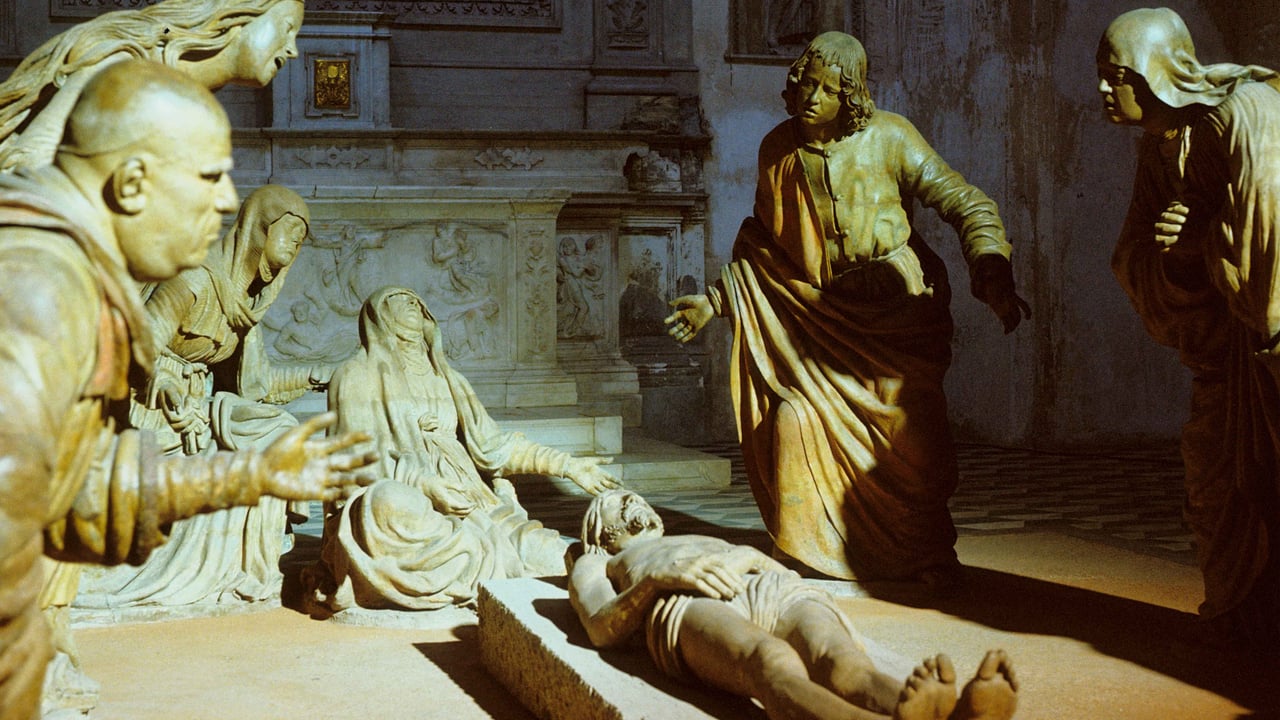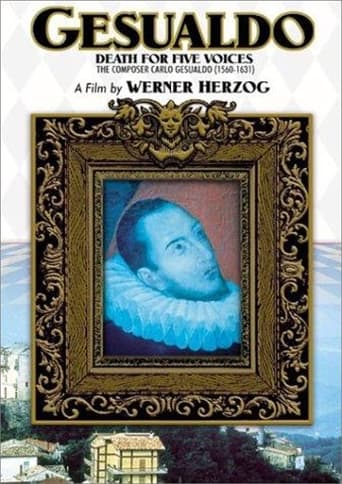

SERIOUSLY. This is what the crap Hollywood still puts out?
... View MoreLack of good storyline.
... View MoreIt's the kind of movie you'll want to see a second time with someone who hasn't seen it yet, to remember what it was like to watch it for the first time.
... View MoreThe movie's neither hopeful in contrived ways, nor hopeless in different contrived ways. Somehow it manages to be wonderful
... View More"Gesualdo" or "Tod für fünf Stimmen"/"Death for Five Voices" is a German television documentary from over 20 years ago. It deals with an Italian composer who was a murderer at the same time. And this is also what interested me the most about this little film we have here. Sadly the murder was so long ago that it is tough to put the focus on it and still keep it close to how it happened. Admittedly, the music in here is far from my genre of preference, but people who like church music more than I do will certainly appreciate it. Other than that, my main motivation to watch this one was that it was made by Werner Herzog and I am a huge fan of the director. I saw there are version where he narrates in German and other ones where he narrates in English, so people outside of Germany can also watch and understand this film. Unfortunately, he decided to give the word to the people at the church here and as a consequence his narration is not half as frequent as I would have liked it to be. It only runs for slightly under an hour, but at this runtime it stays fairly essential. Not one of Herzog's best, but I still recommend the watch.
... View MoreWerner Herzog, in his storied film career, has made many a good documentary and mockumentary. Gesualdo: Death For Five Voices (Tod Für Fünf Stimmen), made in 1995, is not one of them. Coming from a master of cinema, like Herzog, though, that still means Gesualdo is a pretty good film, but don't expect anything of depth. Ostensibly, the film is a chronicle of the life of a 16th and 17th Century prince and musical composer named Don Carlo Gesualdo, Prince of Venosa. One might think that the sordid tale that emerges in the 60 minute, made for television documentary, was crafted just to satisfy Herzog's own dictates about 'ecstatic truth.' The film centers around Gesualdo's murder of his first wife, one Maria D'Avalos. The legend is that Gesualdo hired goons to rub out his wife in her bed, with an aristocratic lover. The bodies were then tossed into the street where a passing necrophilic monk supposedly copulated with Maria's corpse. No, I'm not making this up, as it seems to be a fact. There are also scenes on various estates of the prince where Herzog seems to just happen upon wacky locals (although he has admitted that they were staged events designed to get at a deeper reality about Gesualdo). There is a poor bagpipe playing musician who comes every week to the castle to play music to ward off the prince's evil spirit. At another time we see a supposed attractive red haired female mental patient running through ruins (never being able to lose Herzog's camera- a tip off to the setup), who, when trapped, claims she is the reincarnation of Maria, and that she lives in heaven, which may or may not be an opera box. It just happens that this Italian 'mental patient' speaks English, has a boom box with her, and is wearing a pushup bustier that enhances her massive mammary glands. She was hired by Herzog for the role, and is an Italian opera singer of some note called Milva.But, the worst thing about the film is the hagiographizing of Gesualdo as a musical genius, simply because several modern composers have tried to link him to their work. Yet, when one listens to the compositions played by an amateur ensemble, well, genius is not the word one feels evincing itself. The music is certainly not bad, but it is merely competent. There is none of the instant recognition of greatness one gets from listening to an Erik Satie piano etude nor the internal spark of seduction that a Vivaldi concerto for classical guitar imparts. Yes, there is a certain legitimacy to the gripe that the singers and conductor in the ensemble are not exactly top notch, but even adjusting a bit for amateurishness, the music simply will never be mistaken for something Mozart or Beethoven penned. Yet, this is exactly what Herzog intends- to build a dissonance between the mediocrity of his music and the flamboyance (mostly because of his wickedry) of the man. Why is he profiling this rather obscure (deservedly so) artist? Simple. It is what Werner Herzog must do to be Werner Herzog. In that sense, Gesualdo: Death For Five Voices reveals far more about its creator than it does about its subject. Witness the multiple breaks of the fourth wall, and the sometimes absurdly long takes of people babbling on about Gesualdo's life whilst Herzog's camera strays to a cobweb upon a window or across a once verdant valley that Gesualdo reputedly chopped down himself over the course of several months.What all this might have to do with revelation of something deeper is....well, nothing. If anything, this film's quirky style is its raison d'etre. One feels that, had Herzog not settled on Gesualdo as fodder. He would have made a film about the very next thing that popped into his mind. And the film's style of embellishment upon already wacky reality seems designed to make Gesualdo: Death For Five Voices a This Is Spinal Tap of classical music, or an F For Fake for music. Why? Again, because it's Werner Herzog. Unfortunately, the lack of depth is what ultimately dooms this film. Other than Herzog's interest in the composer and his luridness, there really is no reason for anyone else to be interested, unlike other great documentaries he's done. Lessons Of Darkness, My Best Fiend, Grizzly Man, and Little Dieter Needs To Fly, all had reasons for their making and/or provided a new twist on something not seen before. Gesualdo: Death For Five Voices is just a quirky little television documentary, possibly a made for hire production.Regardless, intent means nothing, and the end result of all the confabulations, half-assed expertise, and staged incidents is a mediocre film, possibly the worst Herzog's ever made, and certainly the worst film of his I've watched. But, again, the caveat is that Herzog is a great artist, so even his worst has moments of artistic and journalistic redemption that makes a viewer smirk, despite his better angels. The film claims that Gesualdo spent the last 16 years of his life as an increasingly insane and reclusive madman. Whether or not this is true is of no real import, but by the end of this 'documentary' I was of the opinion that had Herzog shot the film as a fiction, along the line of his earlier The Enigma Of Kaspar Hauser, the film would have been better for its odd flourishes. A touch of his patented 'eye level realism,' a dash of 'ecstatic truth,' and participants that seem to be a bit more engaged, and Herzog could have really bamboozled a fictive account of the wacky composer that his 'straight' mockumentary misses. As it is, Gesualdo: Death For Five Voices is merely a curio, even if from a master. But, after a curio is in one's grip, it ends up in a corner with dust upon it. Swiffer, anyone?
... View MoreAt a pinch, I suppose I'd accept that some of the lurid carryings-on and local legends that have gathered around the figure of the composer Gesualdo, and are retailed here with a gleeful lack of critical scrutiny, might actually be true. Perhaps quite a lot of them are, but it doesn't really matter, because Herzog seems at least as interested in the way that people create, exploit and enjoy the legends, as in the composer himself or his music. Some sequences are very obviously staged for the camera, and Herzog seems almost to be daring us to believe that we really are talking to, say, a mad ex-opera singer who believes herself to be the reincarnation of Gesualdo's murdered first wife. The results are certainly very, very funny -- but everything pales before the irrepressible wife of a local chef, who disrupts his efforts to tell us about Gesualdo's extravagant menus with a torrent of abuse dedicated at the composer, whom she regards as the devil incarnate.But then, for all its contrivances, the whole film has a deadpan, dishevelled feel about it. No effort is made to disguise that the resident expert Gerald Place is talking from notes or keeps developing a nasty frog in his throat: as one of the few people in the documentary who seems basically sensible, he has to be quietly sent up some other way! Only the intelligent and rather sympathetic Principe d'Avalos seems to escape with his dignity intact -- perhaps because he's aristocracy.Musical duties are divided between two groups of singers. The Gesualdo Consort of London mostly sing in tune, the Complesso Barocco mostly don't -- the avant-garde quality is certainly exaggerated by the problems with intonation in what is very difficult music. As with the interviews with Gerald Place I get the impression Herzog didn't want to do retakes if things went slightly wrong, and the singing certainly has plenty of enthusiasm. Only he can be blamed for the way the audio and visual get out of sync by a couple of seconds in close-ups of the director in one of the musical performances; but somehow it all seems to add to the effect of cheerful bizarrerie. How a specialist in Renaissance music would react to this documentary I dread to think (I'm sure there'd be some swearing and gesticulation) but as social comedy it's priceless.
... View MoreGesualdo was a nutcase, but a brilliant one. His madrigals are among the most moving moments in music history. You will walk away from this film realizing all of the above. While using what appears to be actual employees at the various sites of Gesualdo's life, we are given a tour of his physical life and his music. There are performance excerpts from his madrigals. There is a learned professorial type giving us a biography of his life.Simply put, if you enjoy great vocal music, you will want to go out and buy recordings of this master artist. I have recordings of his first 5 books but I can not yet find a recording of his 6th book of madrigals. This film is not quite the over-the-top approach that Mr. Herzog usually takes, but it is quite strange anyway. It is now out on DVD and I highly recommend it.
... View More